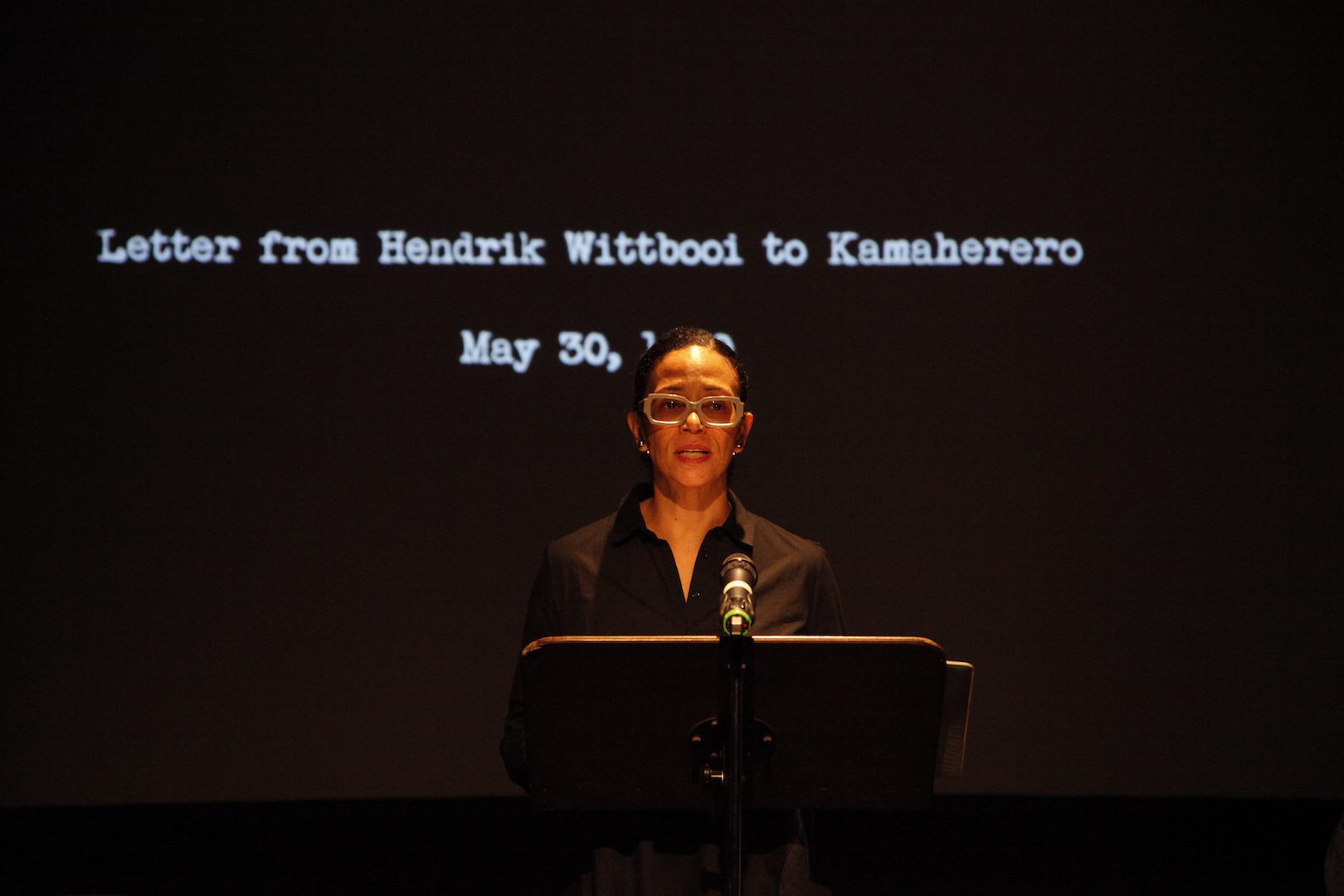Coco Fusco spoke with our author Jasmina Al-Qaisi about her latest research and the reception of her performance

Coco Fusco, Words May Not Be Found, 2017, Performance at SOPHIENSÆLE (2017), co-produced with KW Institute for Contemporary Art, Berlin. Courtesy of the artist. Photo: Diethild Meier.
Words May Not Be Found is a new performance piece by Cuban-American artist and critical writer Coco Fusco. It looks at the trauma of the genocide of the Nama and Herero people that took place in German South-West Africa. Together with seven Berlin-based interpreters, Fusco examines testimonies to the atrocities in painful detail. She spoke with our author Jasmina Al-Qaisi about her latest research and the reception of her performance
Jasmina Al-Qaisi: Do you think that your performance put people face to face with either reality or history?
Coco Fusco: I think the performance is about facing historical realities that affect our current sense of who we are and where we come from. What struck me when I was studying the material was how many connections there are to the present. I saw parallels with how credit and debt are used to exert political control over underdeveloped countries, I saw examples of economic ways of engaging in violence that were very similar to the present day. That was very interesting to me. I could also see Europeans talked to “the natives” in one way and talked among themselves about the natives in another. It was also interesting to compare and contrast what was happening in German South West Africa with what was going on in French and British colonies, and what Americans were doing in the Philippines and Cuba. I see the connections.
JA: You see the connections because of your past work?
CF: Yes, but as a Cuban-American artist I am also looking at this moment in German history as an outsider. I saw connections between the pseudo scientific studies done on the skulls and other body parts of Africans who rose up against German colonizers and treatment of the black American slave Nat Turner, who led a rebellion in 1831 in Virginia. Nat Turner was executed, flayed and beheaded. His skull was taken for medical study in an attempt to determine how he could have imagined a violent means to obtain freedom.
.

Coco Fusco, Words May Not Be Found, 2017, Performance at SOPHIENSÆLE (2017), co-produced with KW Institute for Contemporary Art, Berlin. Courtesy of the artist. Photo: Diethild Meier
.
JA: Do you feel that being an outsider was an advantage or disadvantage, since you were doing this work in a kind of in a long distance way?
CF: Well, if I had been in Berlin I would have had direct access to archives and I probably would have spent more time looking at physical documents. But I had to do everything from far away so I had to rely largely on what was available digitally. I don’t know whether that’s an advantage or a disadvantage. Being an outsider means that I don’t have a sense of a particular kind of guilt that would prevent me from doing certain things. For me the important issue right now is that in the last four to five years I have encountered more and more people in Germany who are interested in the topics that I work with. 20 to 25 years ago, that wasn’t the case. I dealt with a lot more resistance, a lot more indifference and a lot more questioning. Now, I don’t see that anymore. And that is something for me to be happy about.
JA: Do you think your performance would have functioned 20 years ago?
CF: No, because there wasn’t the same critical mass of people ready to receive the information. Today a lot of people are coming to these kind of performances. They stay and they want to talk. That’s important. That’s good enough.
JA: One last thing. How did you feel, when you witnessed the reactions of the audience in Berlin, this real interest? Did you feel like: “I told you so” or what was your internal response?
CF: No, I feel a sense of relief. I can’t walk around all my life being angry. I remember in the 90s I had meetings with some Afro-Germans who were very frightened and very isolated and very lonely. They would say things like “what do we do, help us, what do we do?” and I told them I thought they would have to wait until the immigrant population was bigger and more settled and a generation of people could get through the educational system, and be in a better position to challenge the notion of what it means to be German. And now I see that happening.
.
.
Jasmina Al-Qaisi is a visual ethnographer and a cultural correspondent. She lives in Berlin and works in the archive of the art and project space SAVVY Contemporary.
More Editorial